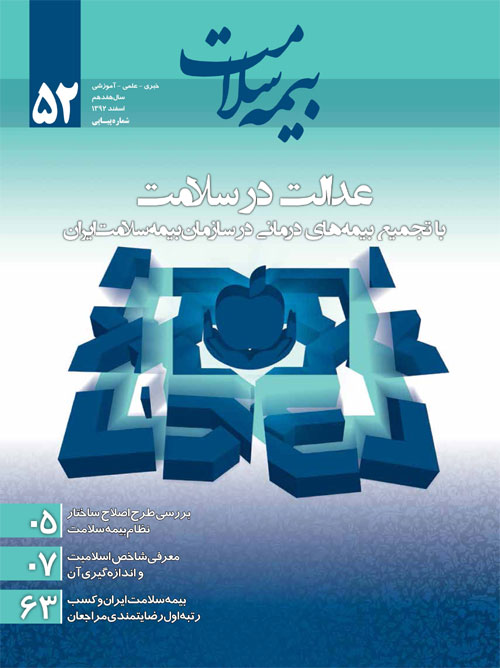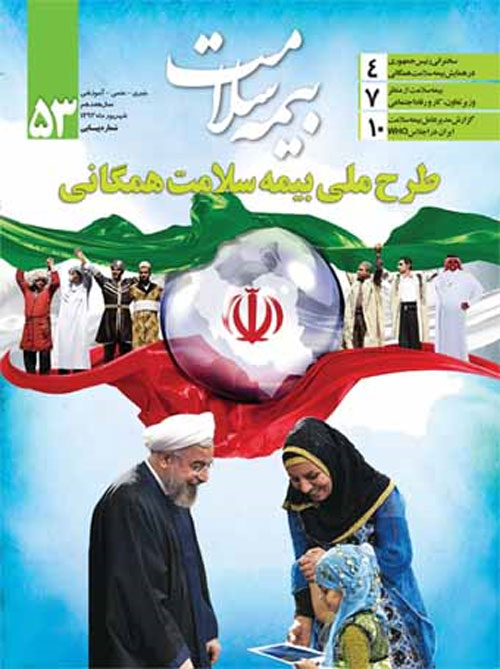فهرست مطالب

فصلنامه بیمه سلامت
سال هفدهم شماره 52 (اسفند 1392)
- تاریخ انتشار: 1392/12/15
- تعداد عناوین: 24
- سخن نخست
- دیدگاه
- مقاله
- گزارش
- گفت و گو
- اخبار
-
صفحه 70
-
صفحه 74
-
صفحه 78
-
صفحه 80
- قوانین
-
صفحه 91
-
Page 7The complicated relationship between religion, economics, financial provision, policy, rules and regulations, and social behavior, is the point of debate, since September 11th, to consider the influential role of religion on the economic, political and social vista of the countries, or vice versa. In other words, should religion be taken as an independent element, or the contrary? Therefore, the matter is posed in this way, that do the countries which have announced themselves as Islamic, follow the principal lessons of Islam? Responses to this question would open up the way for surveying the subject matter of influence of Islam on the economic, political and social behavior. The following text is going to scrutinize the characteristics of an Islamic country referring to Quran and prophet Mohammad (PBS)’S traditions (life, experiences, and hadith) that delivers a guideline to the Muslim. Henceforth, the measuring indicator of the countries being Islamic is determined and announced. For 208 countries, The Islamic indicator has been announced, using the relevant indicators to the governmental and legislative economics, the political and human rights and international affairs.
-
Page 20Throughout all studied countries, the movement towards the public social insurance coverage is traced to be spontaneous with a systematic progression throughout the whole process of evolution. The organizational resolutions have delivered diverse ways of coming to such developments. Their classification that was initiated from the permanent progression of different disease funds was deliberately executed, and then was directed towards the progression process of membership by the lawful attempts of the central health insurance organization. It should also be mentioned that the speed of evolution differentiates among diverse countries.
-
Page 26The increase in the currency value has caused an increase in the health services expenditures and the insured’s share in provision of these expenditures. To study this influential issue, the present study has been accomplished through three sections including, the study of the variation of six imported medicines prices in Tehran Health Insurance General Office, the study of the last prices of the medicines, and medical equipments from the price announcement file of the organization, and also searching the announced prices to the insured, in the non- contracted centers, extracted from miscellaneous loss software of IHIO. The obtained results manifest an increase in the health services prices of this year, in comparison with that of last year, and an inflation in health market two times more that the inflation existing for the general products.
-
Page 34With the expansion of knowledge in different sectors, specifically health sector, we are witnessing the progression, increase, and the import of the novel technology in health sections, medical and diagnostic sectors throughout the country. The receivers of the medical and diagnostic services are also after getting the best and the newest kind of services. On the other hand, the financial resources of the health sector are limited, whereas, demands are infinite. Therefore, the essentiality of the efficient use of the financial resources and the progression of all social strata’s health level is highlighted to pay more attention to the two missing links of the health sector; 1. to deliver the kind of health services package, capable of providing health to all social strata, 2. To evaluate the medical and diagnostic services and also their actual cost. Through the execution of these two processes, all the beneficiaries of the health sector, including: the policy holders, people, the insured, the service providers (physicians, etc...) and the service purchasers (the insurer organizations) would take benefit.
-
Page 38The most important highway of provision and assurance of a sustainable development of humane societies, is the establishment of a qualified health status for the individuals of the society. From WHO’s viewpoint, the issue of “health” is defined as the following: “Not only having no illnesses and diseases, but having a total, physical, mental, and social satisfaction” Health is not only bearing no diseases, but it is taking benefit from all forms of physical, mental, social, and spiritual welfare. Accepting this definition highlights the importance of the responsibilities of the development institutions, regarding the individuals’ and social health, in direction of a sustainable development. In this article, these issues have been debated upon, and some solutions have been proposed to internalize the matter.
-
Assessing the influential factors on capacitating process of IHIO workers according to Leshey theoryPage 42Human resources is the most important of the resources in the organizations, on which the progress and sustenance of the organizations are based. Hence, capacitating the workers means provision of the necessary capacities to enable them in creating an added value in the organization and working efficiently and effectively, is considered as one of the main solutions of organizational progression. The present study, which her been accomplished among those workers with university degrees in IHIO general offices, to recognize the principal affective factors in capacitating the workers and the degree of their influences. The obtained results, manifest that according to the views of the respondents, the affective factors are as the following: Establishing an organizational commitment, situation, flattening structures, and encouraging the workers to cooperate in the organizational subject matters, among which the most important has been announced as “establishing organizational commitments”
-
Page 46During years, organizations have gained experiences and knowledge through different activities, which are of great value and could aid them in order to execute their organizational processes in the future. This knowledge which is referred to as “organizational knowledge” is obtained from projects and different proposal fulfillment, encountering with new occupational conditions and difficulties, or innovations in direction of causing acceleration in the professional progressions. Therefore, organizational knowledge is of the main assets of an organization and is in need of management, and could have the most influence in avoiding the repetition of the past mistakes. The organizational memory system is responsible for accumulation of the organizational knowledge and its active redistribution among the workers and the agents of an organization. Under such a situation, the organizational memory – the administered organizational knowledge provides an appropriate bedrock for the organizational acquisition, and exchanges experiences and learned stuff among the individuals and different occupational groups, and consequently it results in the organizational potentiality. There are merely the questioning and analyzing minds or the knowledge-oriented staff who change the information into knowledge, through pre- hypotheses and theories of their minds. The appropriate organizational bedrock which rears such individuals inside itself, and also the way that the organization treats them, are of the debates of this article.
-
Page 53EQ means having the capability of controlling the feelings and emotions of oneself and the others’, accepting the viewpoints of others and controlling the social relationships. It also includes a vast collection of the talents and skills which are influential in the destiny and the life style of the individuals. The aim of the present study is to scrutinize and assess the influence of EQ on the occupational performance of IHIO in Tehran general office. The study is of a descriptive and survey kind. The statistical society of this study consists of all the workers of IHIO, Tehran general office, which are 447 males and females, and the sample volume was calculated according to Kokran formula, 112 individuals. Sampling is simple- accidental. The questionnaire for EQ estimation is Sybria Shring’s and the performance is estimated through Hersy and Goldsmith (ACHIEVE) model. The reliability of the questionnaires was assessed for the mentioned variables respectively, equal to. /788 and. /825 through Gronbakh induction method. The findings in SPSS all represent no meaningful relation between EQ and its different facets, with the occupational performance in Tehran general office, scrutinized. In the long run, there are suggestions, worthy of being paid attention by the top managers and the researchers of organizations.
-
Page 58All present sciences take their legitimacy from morality. Morality is the science of better living. Throughout different religions, morality has its high status and is of great importance especially in Islam. Compliance to Islamic moral principles and accomplishment of different moral merits, such as: Serving, respecting the clients, discipline, trustworthy, responsibility, following the responsibilities, kindness, patience, justice orientation,. .. and avoiding immorals, such as bribery, etc... by the official workers would lead to health system promotion, because Islamic guidelines lead to such highly valued results.


